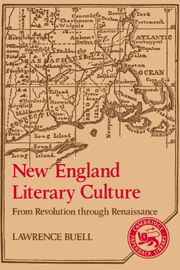Book contents
- Frontmatter
- Contents
- Acknowledgments
- Abbreviations of Frequently Cited Works
- PART I FOUR OVERVIEWS
- PART II THREE REPRESENTATIVE GENRES
- PART III REINVENTING PURITANISM: THE NEW ENGLAND HISTORICAL IMAGINATION
- Part IV NEW ENGLAND AS A COUNTRY OF THE IMAGINATION: THE SPIRIT OF PLACE
- Postscript
- Appendix Vital Statistics: A Quantitative Analysis of Authorship as a Profession in New England
- Notes
- Index
Appendix - Vital Statistics: A Quantitative Analysis of Authorship as a Profession in New England
Published online by Cambridge University Press: 15 October 2009
- Frontmatter
- Contents
- Acknowledgments
- Abbreviations of Frequently Cited Works
- PART I FOUR OVERVIEWS
- PART II THREE REPRESENTATIVE GENRES
- PART III REINVENTING PURITANISM: THE NEW ENGLAND HISTORICAL IMAGINATION
- Part IV NEW ENGLAND AS A COUNTRY OF THE IMAGINATION: THE SPIRIT OF PLACE
- Postscript
- Appendix Vital Statistics: A Quantitative Analysis of Authorship as a Profession in New England
- Notes
- Index
Summary
It is remarkable how the American mind runs to statistics.
Henry David Thoreau, Journal (1854)I let nothing slip, however small; and feel myself actuated by the same motive which has prompted many worthy old chroniclers, to set down the merest trifles concerning things … which, if not preserved in the nick of time, must infallibly perish from the memories of man.
Herman Melville, White-Jacket (1850)The generalizations made in Chapters 2 and 3 about the rise of literary professionalism in New England were based on study of the lives and careers of several hundred authors, examined with a special eye to career patterns, according to period (early national versus antebellum), gender, class, and literary stature (“major” versus “minor” authors). This Appendix presents my findings more systematically than has been done so far in this book, by means of an adaptation of some of the more elementary quantitative methods of recent social history, whose unfamiliarity to many literary scholars will, I hope, prove stimulating rather than repellent.
To study authorial careers in the aggregate tells one little about the aesthetic individuality of literary texts. Such study can be valuable, however, in preventing naive judgments about the uniqueness or typicality of the handful of writers and works in each period on which literary scholarship naturally concentrates.
- Type
- Chapter
- Information
- New England Literary CultureFrom Revolution through Renaissance, pp. 375 - 398Publisher: Cambridge University PressPrint publication year: 1986



